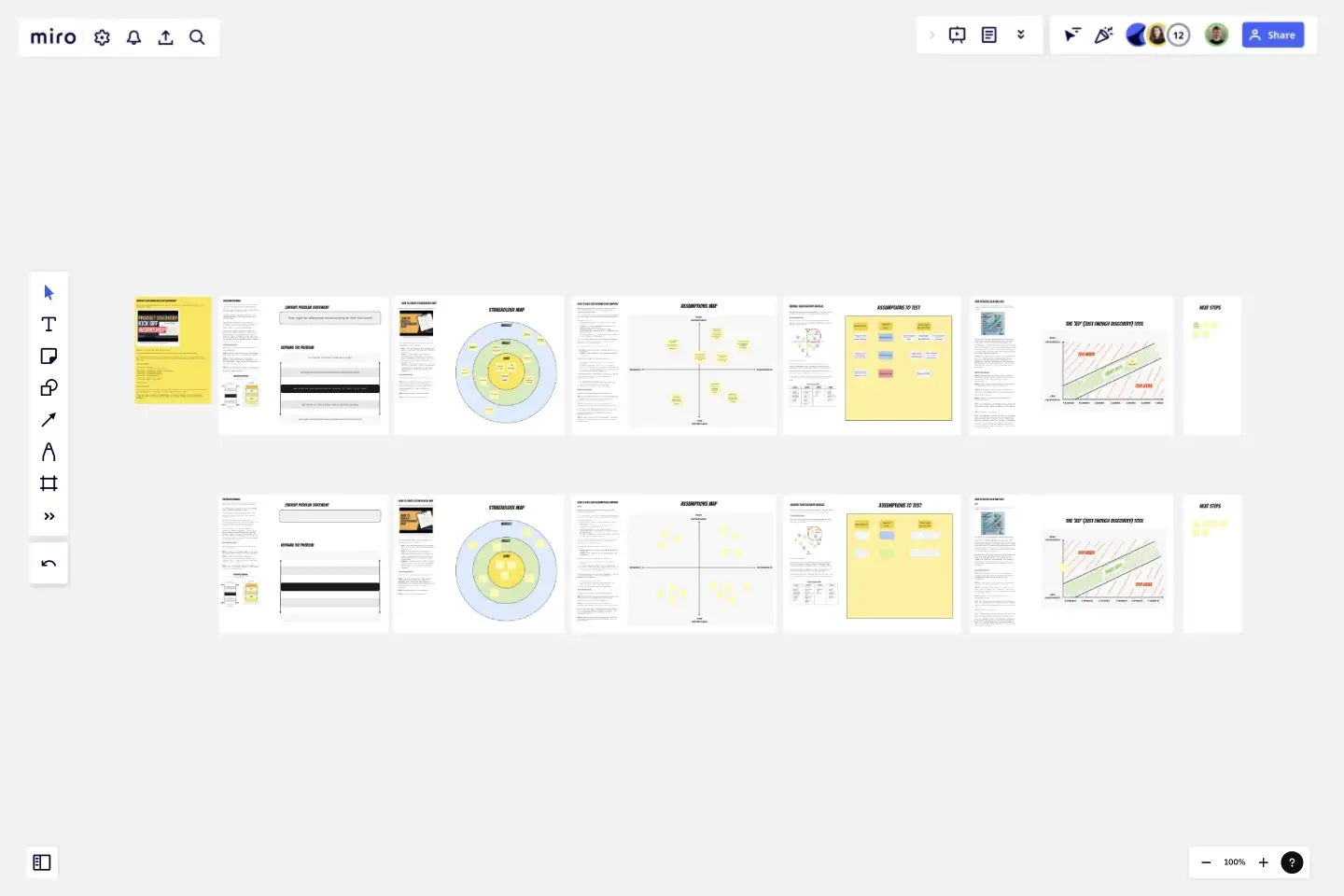Product Discovery Kick Off Workshop
Product Discovery is core part of building great products, but few know how to properly kick off product discovery and maximize its impact.
A proven approach to kicking off discovery for new opportunities. To date, I've coached 100s Product Managers on this approach and embedded this workshop at dozens of companies through my coaching and consulting.
The workshop is deliberately designed to be collaborative - so include your stakeholders and do the workshop together!
Proposed Agenda:
~5 minutes | Welcome
~15 minutes | Summary of the Opportunity
~20 minutes | Reframe the Problem (if necessary)
~20 minutes | Stakeholder Mapping
~30 minutes | Assumptions Mapping
~15 minutes | Discovery Plan
~10 minutes | Agreed on a Time-box
~5 minutes | Next Steps & Close
Total: 2 hours
This template was created by Ant Murphy.
Get started with this template right now.
Feature Planning Template
Works best for:
Desk Research, Agile Methodology, Product Management
Features are what make a product or service fun, but adding new ones is no walk in the park. It takes many steps—ideating, designing, refining, building, testing, launching, and promoting—and just as many stakeholders. Feature Planning lets you put a smooth, sturdy process in place, so you can add a feature successfully, and spend less time and resources doing it. That makes our Feature Planning Template a smart starting point for anyone looking to add new product features, especially members of product, engineering, marketing, and sales teams.
Product Ops Canvas
Works best for:
Product Management, Planning
The Product Ops Canvas template helps product managers align product strategies with operational capabilities. By mapping out key operational processes, tools, and metrics, this template fosters alignment between product and operational teams. With sections for identifying bottlenecks and optimizing workflows, it supports continuous improvement in product operations. This template serves as a guide for driving efficiency and scalability in product management processes, enabling teams to deliver high-quality products at scale.
Midnight Sailboat Retrospective
Works best for:
Retrospectives, Meetings, Agile Methodology
The Midnight Sailboat Retrospective template offers a metaphorical journey through past experiences and future aspirations, likening the retrospective process to a midnight sailboat voyage. It provides elements for reflecting on challenges faced, lessons learned, and goals for the future. This template enables teams to navigate uncertainties, chart a course for success, and foster a culture of resilience. By promoting reflection and metaphorical thinking, the Midnight Sailboat Retrospective empowers teams to overcome obstacles, embrace change, and sail towards their goals effectively.
Product Vision Statement
Works best for:
Product Management, Planning
The Product Vision Statement template helps product teams articulate clear and inspiring visions for product development. By defining long-term goals, market aspirations, and customer value propositions, this template aligns teams around a shared vision for success. With sections for outlining strategic objectives, guiding principles, and success metrics, it provides clarity and direction for product development efforts. This template serves as a compass for product teams, guiding them towards meaningful outcomes and driving innovation and growth.
AI Product Canvas
Works best for:
Product Management, Planning
The AI Product Canvas template facilitates the development of AI-powered products with a comprehensive framework. By defining AI capabilities, data requirements, and ethical considerations, this template guides teams through the AI product development process. With sections for identifying use cases, defining algorithms, and assessing model performance, it ensures that AI solutions meet user needs and ethical standards. This template serves as a strategic guide for developing innovative AI products that deliver value and drive business success.
Daily Schedule Template
Works best for:
Planning, Project Management
The Daily Schedule Template is a vital tool for managing daily routines efficiently. It helps plan and organize tasks, appointments, and priorities with great precision. Its adaptability allows users to allocate time efficiently, adjust schedules as per changing priorities, and navigate the day with ease. With this template, individuals can integrate daily activities with their broader goals, contributing meaningfully to their overall success.
